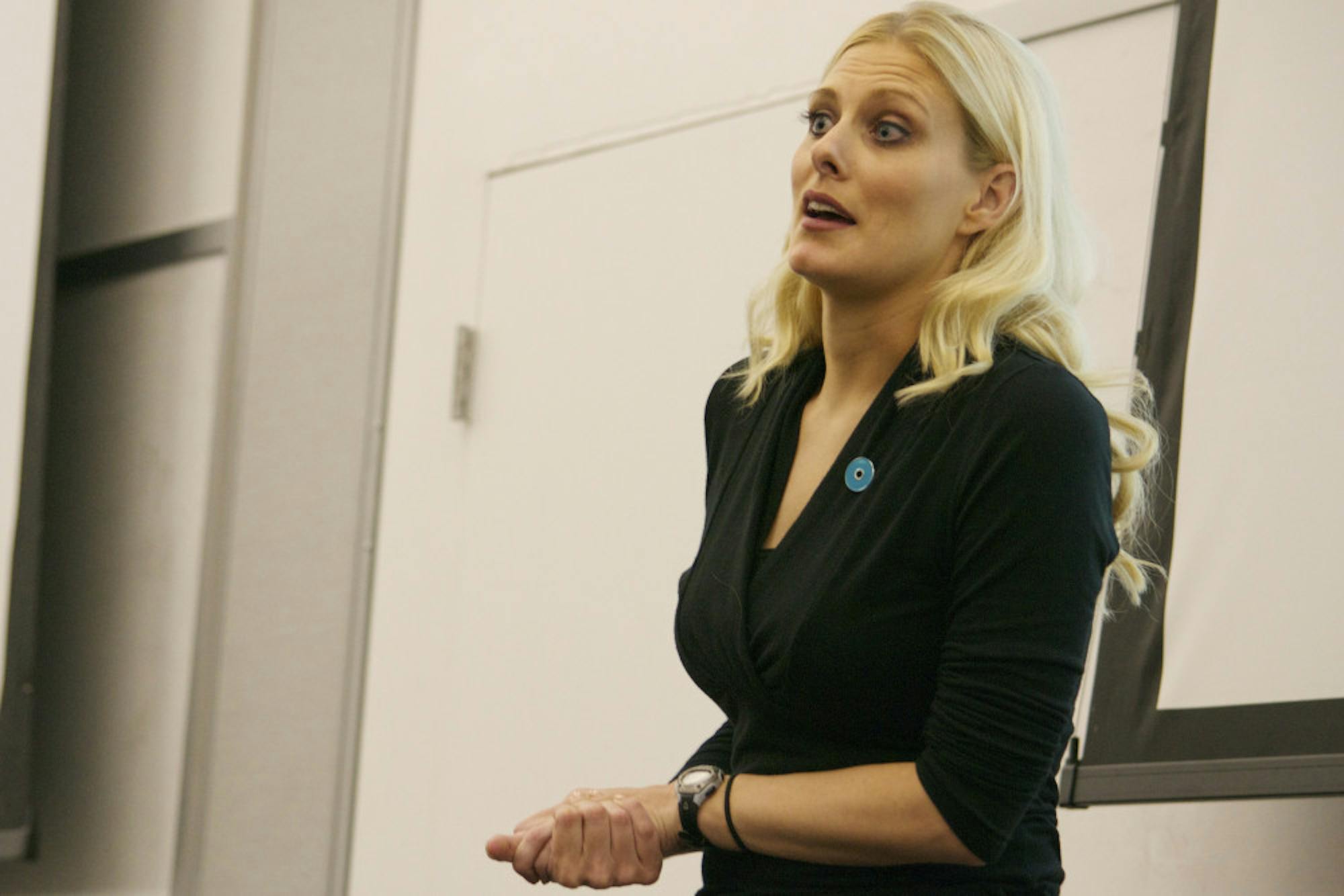Katie Hnida, the first woman to ever play and score points in Division I-A college football, visited Tufts last night to discuss her experience with sexual harassment and rape in college athletics. Hnida, who was hosted by the Tufts Athletics Department’s Student Athlete Advisory Committee (SAAC), spoke to a full audience in the film room of the Steve Tisch Sports and Fitness Center.
The committee introduced Hnida as an active and well-known proponent of female empowerment in sports, as well as a welcome addition to the department’s established roster of guests, which they noted has shown a lack of female speakers in recent semesters.
“It was 11 years ago that I started speaking,” Hnida said, thanking the audience, which was made up mostly of student athletes, for their attendance. “It all started because I absolutely adored the game of football.”
Hnida opened with her experience growing up in a markedly inclusive community in the 1990s, where she was able to join her varsity high school football team as a freshman back-up kicker with little to no difficulty.
“On a whim, I propped up the ball and took a swing at it,” she said, describing her first experiences playing football as a 13-year-old. “I spent the night kicking and thought -- ‘could I ever actually get onto a football field?’”
Hnida added that after some initial “murmurs and laughter” in tryout season, her peers easily adjusted to the relatively rare addition of a female to the high school football team. She said she bonded with her fellow players, earned the homecoming queen crown and was invited to apply for the position of kicker at the University of Colorado.
It was there, Hnida explained, that reactions to her gender on the field turned “sour.” She recalled being bombarded with derogatory comments and threats that flew under the radar all throughout her off-season training.
“The [player next to me] said, ‘go home prom queen, girls can’t play football,’” she said. “I was scared to death. Not only were the guys being verbally abusive with me, but they were also exposing themselves to me starting the second day of practice.”
Hnida underscored the disregard for the harassment she experienced while on the team.
“I was so confused because so much of this harassment was happening right out in the open,” she explained. “Coaches were witnessing guys reaching between my legs, rubbing me, feeling whatever they could. One player on the team took to throwing footballs at my head … and the coach responded by saying, ‘what do you expect, he’s from Texas.’”
Hnida shared with the audience that these abuses led to harassment in elevators and locker rooms, accompanied by threats of getting kicked off the team if she reported another player.
“It was like a living hell,” she said. “I couldn’t understand why no one was saying anything. Why did these coaches not care? I went into survival mode, thinking this is just something I’d have to put up with.”
She continued with this attitude until her rape by a trusted teammate rendered her mentally and physically incapable of continuing her time at the University of Colorado. To this end, Hnida underscored that the assailants are often people the victim knows.
“Back then, we were warned of strangers and alleyways and unguarded drinks,” she said. “No one actually addressed real kinds of sexual assault. I’m hoping it is different now, at Tufts and across the nation -- the way they talk to you about sexual assault to reinforce that you can speak up and it’s never your fault. Instead, I convinced myself it couldn’t be rape because it was someone I trusted.”
Although Hnida described a long period in her life during which she was haunted by this assault, keeping it to herself, she said she eventually opened up to her loved ones and sought help. Hnida explained that she then went on to play for University of New Mexico, where she found a more accepting community and scored what would be the first points for a woman in NCAA football history.
“We forgot about gender roles,” she said. “I like to cook and I like to kick a football. It’s that simple.”
Before opening the conversation up to questions from the audience, Hnida cautioned the audience against blind loyalty towards teammates taking precedence over the recognition of a real or potential safety risk. Closing the presentation, however, she noted the positive aspects of college athletics.
“Really enjoy this time in your life. There is something so absolutely amazing about being on a team in college,” Hnida said. “And if each of us pick one thing wrong in this world and really work at it, get passionate about it ... we’ll be able to fix a hell of a lot of problems.”
Hnida discusses sexual assault experience in college athletics

Katie Hnida speaks to Tufts athletes about her experiences as a woman on a college football team and as a survivor of sexual assault.





